We remain steadfast in our mission and know that we’ll now have to work even harder to help save and improve lives, as the already-poor will undoubtedly be the hardest hit by this crisis.
“As bad as the coronavirus has been in wealthy countries, it will likely be much more devastating in poor countries that have worse health-care systems. In many places, social distancing is not even an option. Imagine how quickly the virus may spread in a crowded refugee camp without adequate hygiene and sanitation.”
– Susan Athey and Dean Karlan
All of our recommended nonprofits are pivoting rapidly and taking exemplary steps to safeguard their staffs during the crisis. And many of them are putting specific programs in place that will fight COVID-19’s devastating impact among their beneficiaries and ensure safe delivery of their basic programs. Below are updates about how these organizations are adapting—with help from donors like you!—so they can forge on in these times when their assistance is needed more than ever.
You can donate to our COVID-19 FUND here. Gifts made to this fund will be divided between those of our recommended charities that are running special projects, related to the interventions we already recommend, to address the COVID-19 pandemic. Currently, we are focused on the following charities’ COVID-19 response projects: Development Media International, D-Rev, Evidence Action, Fistula Foundation, GiveDirectly, Living Goods, Malaria Consortium, Oxfam, Population Services International, and Project Healthy Children.
Note that although we believe that the COVID-19 projects being run by these organizations look extremely promising, we feel it is incumbent on us to point out that because of the urgency of the situation, these interventions do not have the rigorous evidence of cost-effectiveness that we normally require before recommending a charity or program.
The following are descriptions from the charities about their COVID-19-related work.
Development Media International (DMI)
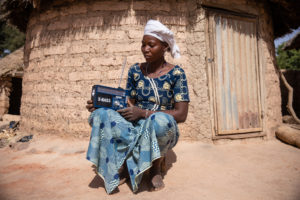
Program description from DMI:
DMI runs radio, TV and mobile campaigns to change behaviours and save lives in low-income countries. We have experienced in-country teams and strong relationships with Ministries of Health in Burkina Faso, Côte d’Ivoire, Ethiopia, Madagascar, Malawi, Mozambique, Tanzania, Uganda and Zambia. DMI was approached in early April by four governments with requests for assistance and is now broadcasting in six of its countries of operation, with ambitions to expand broadcasting to all nine. The campaigns are based on DMI’s Saturation+ methodology, which have been proven through two randomised controlled trials to result in major changes in behaviour.
It is clear that this is a disease that affects everyone, whether directly or indirectly, and its course will be influenced by the extent to which people respect hand and respiratory hygiene guidelines, physical distancing and shielding of the vulnerable. A typical government response to an outbreak is to use standard communication channels, such as press announcements, national media outlets and a single national language. DMI’s added value is in helping governments to achieve a Saturation+ campaign, spreading messages more deeply and persuasively into the population. Our inputs are flexible, depending on government needs, but will draw from the following tools and capabilities:
- Intensity: DMI’s Saturation+ methodology (broadcasting one-minute radio spots 6-10 times per day) has been shown to the highest scientific standards to result in behaviour change.
- Distribution: DMI can roll out campaigns very quickly at national scale, using multiple local languages and optimizing the mix of national and community stations.
- Collaboration: DMI is responding to the needs of government on a day-to-day basis, and is an active member of risk communications and community engagement (RCCE) networks.
- Message enhancement: DMI brings communication and storytelling expertise, which drive behaviour change. It can conduct continuous feedback research to help refine messages as needed.
- Addressing social norms: DMI’s campaigns are designed to shift social norms, including physical distancing and hand hygiene, which will be critical to the long-term response to the pandemic.
- Technical precision: DMI is receiving direct support on our messaging content from Africa CDC and WHO’s Global Outbreak Alert and Response Network.
- Evaluation: We have the capacity, working with Innovations for Poverty Action (IPA), to evaluate campaigns using mobile phone surveys.
DMI has created a Rapid Response Fund to allow it to respond flexibly to the needs of individual countries. Our aim is to raise $2.25 million to launch COVID-19 campaigns in all nine countries. We have already received support from donors such as GiveWell, the Mulago Foundation, the Skoll Foundation and individual philanthropists. This has allowed us to begin producing content and broadcasting in six countries, but a funding gap of $1,000,000 remains. We would welcome the opportunity to speak to partners who might be able to support this work in any way they are able.
GiveDirectly
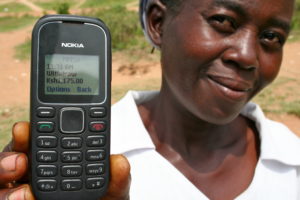
GiveDirectly is the leading global NGO specialized in delivering digital cash transfers.
We’re responding to this crisis by doing what we’ve done for a decade: delivering cash. We’re doing so quickly and safely using mobile money to families impacted by COVID-19 in Africa.
We are deeply concerned for these families. As governments impose lockdowns to limit the spread of COVID-19, many families will suddenly be unable to continue earning a living. Few will have the financial resources to weather this storm, let alone provide care if a family member falls ill. To make matters worse, traditional aid programs that rely on face-to-face interaction may need to scale back at the same time.
This is the moment for digital cash. To protect the safety of recipients and staff, all enrollment and payment processes will be conducted remotely from end-to-end.
To begin, we’re targeting low-income, informal sector workers in urban areas.
We will focus first on urban areas, where we expect the economic impacts of COVID-19 will hit first and hardest. We’ll coordinate with local governments and NGOs to identify and prioritize underserved groups. To start, we’re partnering to enroll recipients — mostly youth— in Nairobi slums.
We’re using a basic income model as a short-term assistance solution
Each household will receive $25-50 per month (dependent on location), initially for 3 months. We expect the main constraint on how many we can reach will be how much we can raise.
Direct Implementation
As we work to target particularly vulnerable recipients impacted by COVID-19, we will occasionally work with partners to reach recipients more rapidly. We will continue to own the end-to-end implementation process. As we scale, we will use a combination of (a) our own existing databases of low-income households, (b) rosters provided by local NGO partners whom we have vetted, and (c) rosters of mobile money subscribers recruited through our partner mobile network operators. Specific approaches will vary across countries.
In parallel, we will continue to pay previously enrolled recipients in all six countries with live projects (Kenya, Uganda, Rwanda, Liberia, Malawi, and the DRC), and have already shifted to a remote follow-up model. We completed payments to 13,806 recipients in March totaling over $2.5M.”
Giving directly to families in extreme poverty has always been a great opportunity to do good, but it’s an extraordinary opportunity now.
During the crisis, all GiveDirectly donations made through TLYCS will go to their international Covid-19 response.
GiveDirectly was just featured in this New York Times article on giving to those who need help the most.
Fistula Foundation
At Fistula Foundation, our team continues to receive sobering dispatches from local doctors in the field as they grapple with Covid-19. An acute economic crisis has forced hospitals to lay off staff, limiting their ability to treat even basic health care needs. While early lockdowns in some African and Asian countries have limited the spread of the virus, a global pandemic of this scale has the potential to completely devastate their nations’ health systems.
We at Fistula Foundation are in a strong position to help. We have built proven relationships with vetted partner hospitals in more than twenty countries. They work in Africa and the poorest corners of Asia, where the pandemic and its economic impact are hitting the hardest.
To help, Fistula Foundation has launched a Covid-19 Emergency Response Fund. Our goal is to deliver support directly to our hospitals on the front lines. 100% of your gift—every penny—will go to the field. All overhead costs will be covered by our rainy-day fund.
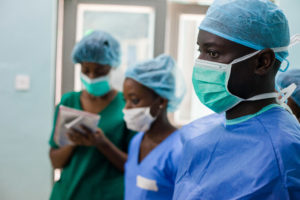
Your gift today could help provide:
- Personal protective equipment, like masks and gloves
- Infection control training
- Nursing and other staff salaries to prevent layoffs
- Bleach and other cleaning fluid.
Our partner hospitals are led by trusted experts like Nobel laureate Dr. Denis Mukwege and legendary activist Edna Adan, both of whom we’ve worked with for over ten years. These partners are thoroughly vetted. We know they use our money wisely. You can be confident that your gift will go straight into their capable hands.
This fund is separate from our fistula treatment program and will close when a vaccine becomes available.
Population Services International 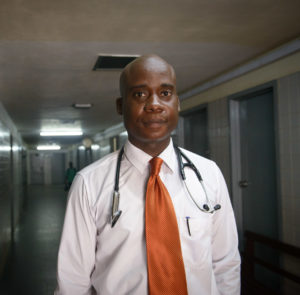
A message from PSI CEO, Karl Hofmann, April 22nd:
“In this rapidly evolving crisis, PSI is applying our 50 years of expertise to answer the needs of local Ministries of Health and ensure that the people we serve are able to access critical self-care, prevention and healthcare services. Our COVID-19 response builds on our experience from previous outbreaks — including Ebola, Zika and cholera — to rapidly design, deploy and continually improve interventions that are effective and follow evolving global learnings. We are designing our response in close collaboration with our partners, all under each specific, national context.
PSI teams worldwide have already begun to:
- Social behavior change:
- Promote non-pharmaceutical interventions through social behavior change communications that will help stem the outbreak, such as handwashing, social distancing and providing access to reliable sources of locally relevant information, as with a campaign created in Laos in partnership with the Ministry of Health.
- Curb the spread of false information surrounding COVID-19 by rapidly creating localized marketing strategies to dispel myths and provide accurate information on transmission, prevention and symptoms, as our cyber educators are doing throughout Central America.
- Digital tools and self-care
- Expand our digital footprint to reach users with key prevention messages, self-risk assessment and when needed, referral for clinical care, as with the use of our digital platforms originally built for HIV Self-Testing in many African countries.
- Systems strengthening:
- Support health providers and pharmacy staff to provide point-of-care information, accurate COVID-19 risk-counseling, diagnosis, treatment and case reporting, as in South Africa and Angola where we are bringing e-learning about the disease to community health workers.
- Government coordination
- Support Ministries of Health to establish and strengthen existing emergency operations centers, which track disease and response efforts nationally and regionally as happening currently in Laos and Myanmar.
- Build on our current information system capacity to support data capture and reporting from the health care sector to aid ongoing disease surveillance and better prepare ourselves and partners for future outbreaks with the many Ministries of Health we support to use the world’s largest digital health management information system.”
You can read more about PSI’s response here.
Sanku/Project Healthy Children
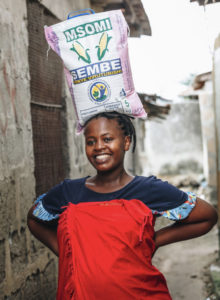
An update from Felix Brooks-church, Co-founding President & CEO
“In response to the current global pandemic, Sanku is ensuring that the two million people it reaches everyday continue to receive life-saving fortified flour during this crisis, while at the same time safeguarding the health of our 31 staff and 357 millers and their families.
- We mobilized a team equipped with the necessary protective gear to stock up over 300 of our partner millers with a multiple-month supply of empty flour bags and nutrient premix, necessary to continue fortifying their flour during this period. By doing so, and by outsourcing the actual deliveries of these goods to a local logistics company, we have eliminated our staff’s chances of being exposed.
- We deployed “Health Kits” to every single miller, packed with a generous supply of protective gloves, masks, medicated soap and hand sanitizer for all estimated 1000 mill staff across Tanzania. Sanku is determined to maintain improved health and hygiene for all our staff and millers, as well as for the essential food the millers produce for two million people every day who critically need strong immune systems at all times, but especially during this crisis.
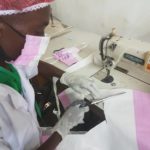
Making masks from empty flour bags. - Protective masks have run out in Tanzania, and new ones are not being imported at present as the government is concerned about potentially bringing in contaminated products. But we have a lot of empty flour bags from past millers that we no longer work with, which we have tested and made into masks . We have submitted these masks to the Tanzania Medicine & Medical Devices Authority last week, and expect to shortly receive a permit to mass produce. We have enough stock to make millions of
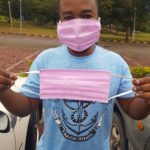 masks. It will cost about a $1 per mask for materials and labor. With sufficient support, we hope to be able to donate masks to hospitals, clinics and healthcare workers.
masks. It will cost about a $1 per mask for materials and labor. With sufficient support, we hope to be able to donate masks to hospitals, clinics and healthcare workers. - Because schools have shut down in Tanzania for the foreseeable future, millions of children have lost access to school feeding programs, which are often a child’s primary daily meal. To help address this crucial need:
- We have partnered with USAID to launch an SMS campaign informing approximately 3000 families (~15,000 members) with general COVID health information, as well as informing them of the shops that are selling fortified flour in their area, representing roughly 80 schools.
- In partnership, we are looking at the recent Rwanda model, where they are doing staggered school feeding programs, using the schools as distribution points where families can pick up fortified flour. We may pilot this in the Iringa Region of Tanzania, along with subsidising the millers’ flour and/or giving the schools dosifier machines, as some have small mills on campus.
To continue doing this, we desperately need capital now to build up inventory levels of flour bags and nutrient premix, and immediately purchase additional health kits for our millers and their families, as well as families of the school children now forced home due to school closures. If we are unable to do this, we would be depriving millions of the basic human right of nutrition and health safety. Our team is ready to do their part, but we need the support of our donors.”
Oxfam
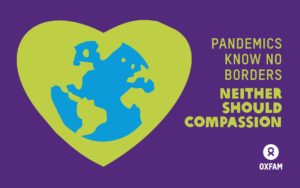
When a crisis like the COVID-19 pandemic hits, the poorest communities around the world suffer the worst effects. Women and girls usually bear a disproportionate burden of care in a crisis like this one. That’s why we are working with partners to reach more than 14 million people in nearly 50 countries to prevent the spread of the disease in vulnerable communities and support people’s basic food needs and livelihoods. This includes providing water, sanitation and public health promotion, as well as meeting the urgent needs of people facing conflict, displacement, and hunger. In all our programs, Oxfam is putting women at the center of our relief efforts by ensuring women are involved in decisions that affect them and advocating for policies that protect their well-being and livelihoods.
Examples of Oxfam’s global COVID-19 relief work include:
- In Bangladesh, Oxfam has stepped up its work on hygiene promotion and water and sanitation facilities in the Rohingya camps in Cox’s Bazar, where some 855,000 refugees currently live in extremely overcrowded conditions. We plan to help 70,000 refugees and 5,000 members of the local Bangladeshi community with these activities. We have reduced all other non-essential activities in the camps to support social distancing efforts. We are also continuing to advocate for aid workers to be allowed to work in the camps to provide essential services around hygiene, clean water, and sanitation.
- In the Za’atari refugee camp in Jordan, Oxfam has already carried out awareness sessions on the pandemic and proper handwashing with more than 2,000 children. With Jordan now in complete lockdown and access to the camp limited, all agencies are focusing on hygiene awareness messages and campaigns using WhatsApp groups to promote health and hygiene.
- In Yemen, families, and communities have endured more than five years of conflict, which has left the health system in ruins, and has pushed vital resources like clean water, safe shelter, and proper nutrition out of reach for many. Oxfam’s Yemen country team is responding with public health promotion specifically on COVID-19 prevention including training for community health volunteers to engage in community awareness campaigns, and support to health facilities with hygiene care materials. The team is also supporting traders to maintain food supplies, encouraging home vegetable production, and providing kitchen garden kits to ensure household access to some basic food items. Oxfam is also providing cash transfers and cash-for-work activities focused on environmental health.
- In Burkina Faso, Oxfam and our partners are prioritizing assistance for people displaced within the country by conflict as well as the communities hosting them. The program aims to improve community knowledge on COVID-19 and prevention measures and to foster community engagement in the face of this pandemic. Activities underway now include working with water management committees and volunteers on COVID-19 prevention measures, and improving access to water and sanitation, promoting good hygiene, and supporting local health services in close collaboration with local health authorities. Oxfam intends to reach 105,000 people.
- Assistance to people already suffering from drought in the Dry Corridor of Guatemala is also part of Oxfam’s response to the COVID-19 pandemic. Oxfam and our partners have delivered food and hygiene products to 700 people in mainly indigenous communities. Oxfam is providing protective gear (masks, goggles, disinfectant gel) to community leaders and midwives — both groups are key to providing basic health assistance in rural communities.
Oxfam is also calling for a global package of nearly $160 billion in immediate debt cancellation and foreign assistance to help developing countries prevent the spread of the disease and build the capacity of health systems to care for those affected.
Malaria Consortium’s Seasonal Malaria Chemoprevention program (SMC)
Statement from Malaria Consortium
Seasonal malaria chemoprevention (SMC) is an essential health service that saves lives. This remains the case despite the COVID-19 pandemic. In line with World Health Organization (WHO) recommendations, Malaria Consortium believes that discontinuing SMC would risk a substantial increase in malaria cases and deaths among those most vulnerable to the disease: children under five. This would put additional strain on health systems that are already under pressure and likely even more stretched because of the need to address COVID-19. 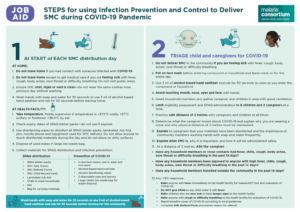
Malaria Consortium is one of the leading implementers of SMC and is uniquely placed to support governments in the fight against malaria. In 2020, Malaria Consortium’s SMC programme aims to reach around 11 million children in Burkina Faso, Chad and Nigeria – up from six million children in 2019.
We are confident of being able to deliver SMC safely during the COVID-19 pandemic and in line with government strategies. We have established extensive enhanced safety and infection prevention contingency measures for SMC campaign planning and enumeration, procurement and supply management, community engagement, training, SMC administration, supervision, monitoring and evaluation. For example, we have developed guidance for SMC delivery by community distributors, which will ensure the safety of communities and distributors. Our plans can be adapted to different levels of COVID-19 risk to ensure continuity and minimal disruption to the campaign.
We recently started the SMC training of trainers regarding prevention of COVID-19 and how drug administration will differ this year. They will in turn cascade the training down to everyone else. We have provided a new job aid and training materials. We are in the process of procuring touchless thermometers, face masks, hand sanitizers, disinfectant wipes and solution, and biowaste bags for disposal.
These measures have become far more expensive than we originally anticipated due to higher prices than usual. SMC season begins in mid-July, so time is of the essence. We appreciate all donor support towards our current need of $800,000.
You can read more about Malaria Consortium’s COVID-19 response and see links and resources here.
Evidence Action
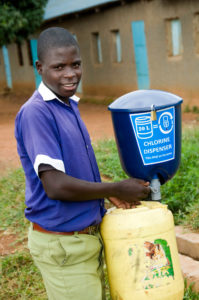
During the current pandemic, services that meet basic human needs – food, water, shelter, health care, education – are as crucial as ever.
Our Dispensers for Safe Water program provides access to safe water to help prevent child mortality from diarrheal disease, which claims the lives of an estimated 525,000 children under five every year. When we last shared our COVID-19 response in Africa, we had just completed the rapid delivery of 400,000 liters of chlorine, 46 tons of soap, as well as informational material and an assortment of hardware parts, to rural villages in Kenya, Uganda, and Malawi. This ensures our communities have uninterrupted access to safe water, even if logistical networks shut down.
In line with our values, we’re now ‘thinking big’ and ‘acting urgently’ to do more. Since early April, we’ve delivered 1,600 tons of soap for handwashing (equivalent to the weight of ~250 African bush elephants!), 34,000 liters of chlorine for disinfecting (enough to fill 3 cement mixers), and hygiene education to help over 4 million people (about the population of Los Angeles) protect themselves against COVID-19. More deliveries will take place over the next few weeks.
How have we been able to do this in such a short time? By leveraging the supply chain that underpins Dispensers for Safe Water. We purchase soap and chlorine from suppliers in major cities, and use a rented fleet of trucks to transport them to our field offices. From there, our ‘circuit riders’ strap boxes to their motorbikes and ride to villages, handing supplies to local volunteers – there are over 50,000 volunteers! – who then deliver them to households. In Kenya, this work has been made particularly difficult by the weather, with heavy rains creating hazardous road conditions.
Our volunteers, known as ‘promoters’, are critical to the Dispensers for Safe Water ‘last mile’. Elected by their communities to stock, maintain, and guide the use of their local dispenser, they’re now going above and beyond to distribute supplies, identify and regularly disinfect frequently touched surfaces, participate in training on COVID-19 symptoms and prevention strategies (such as good handwashing practices and social distancing), and share these messages with their communities.
We are immensely proud and grateful for the dedication and perseverance of the staff and volunteers undertaking this work. The endorsement of our government partners has also been invaluable: project launches were presided over by officials in Kenya and Malawi, and the Ugandan Ministry of Health has instructed District Health Officers to support our activities.
We have preliminary data, collected via phone surveys, that shows our work is paying off:
- Approximately 99% of households have received a bar of soap from a Dispensers for Safe Water promoter.
- Household knowledge of handwashing as a COVID-19 prevention strategy is 100%.
- Awareness of the symptoms of COVID-19 is almost universal, at 99-100%.
The proportion of promoters who’ve reported receiving stickers and flyers is far lower (ranging from 40-70%); we’re working with our field teams to understand why. It’s possible there’s an issue with how we ask the question, as the majority of households (60% in Kenya, 62% in Uganda, and 88% in Malawi) do report having seen stickers with handwashing messages on their local dispenser.
We’re also exploring how we might partner with other organizations and leverage our Dispensers for Safe Water platform to deliver other interventions (such as bednets and prophylactics to prevent malaria). We look forward to sharing our progress.
These efforts are not only outside of our normal program scope; they are outside of our program budget. As such, we are fundraising to provide the supplies noted above. Thanks to the swift generosity of a few key funders, we have already secured significant support for these actions; we invite others who are interested in supporting these efforts to donate.
Living Goods
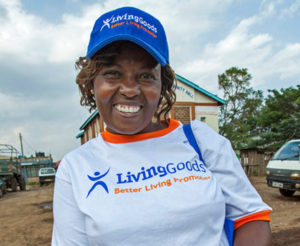
Living Goods is working with the Ministries of Health (MOHs) in Kenya and Uganda to mitigate COVID-19’s impact, as well as invest in the safety and training of over 10,000 community health workers (CHWs) who will be integral to ensuring successful preventive, diagnostic, and management services for COVID-19.
We know that strong, formalized CHW systems can save lives, increase access to care, contain health crises, and keep healthcare affordable, all while delivering a positive economic return, reducing unemployment, and empowering women. Living Goods has been supporting governments in building these critical health systems in Kenya in Uganda for over a decade. It is more important than ever to maintain our progress in the face of this pandemic – both for the communities we now serve and for the communities we hope more CHWs can serve in the future.
With this in mind, Living Goods is prioritizing our work around three complementary objectives, with activities focused around supporting communities in the short and long-term. Through these three integrated pillars, we will:
- Directly respond to the health risks posed by COVID-19 by protecting CHWs and their communities to prevent the spread of COVID-19. Cases in Uganda and Kenya are still low enough that we believe immediate interventions will directly save lives by lowering disease transmission rates and the overall burden of disease in these communities.
- Mitigate secondary health impacts by maintaining and expanding essential health services. We are ensuring that CHWs are trained and resourced so they can continue to provide consultations, diagnosis, and medications while moving to low and no-touch protocols. Our pivot to these new protocols has been swift and efficient, thanks to our digitally enabled CHWS; all were previously trained and equipped with mobile phones and our SmartHealth app. Adapting existing workflows to the current scenario has been and will continue to be key to achieving our objectives around continuity of essential health care throughout the pandemic. CHWs must change the ways they work, and our adapted workflows will enable them to continue to diagnose and treat clients while maintaining appropriate social distancing protocols.
- Alleviate potential long-term negative consequences to local economies and health systems by increasing our investments in key areas. These include micro-level investments in the form of increased stipends for frontline health workers, which will help ensure financial stability for their families; and macro-level investments to strategically augment partner governments’ efforts to respond to COVID-19 at the national and sub-national levels.
To continue these activities for the remainder of 2020, we are currently estimating that we will need at least $6 million. This estimate is for incremental costs, above and beyond our budget for operating in a non-COVID context. Effective, digitally-enabled community-based primary health care will save lives during the COVID-19 pandemic. Building stronger, more resilient health systems will protect vulnerable communities from future pandemics.
Living Goods has the partnerships and experience to effectively deliver on both short and long-term goals during this pandemic – we are grateful for any additional donor support that will help us achieve our objectives. Together, we can resource and support community health workers, communities, and governments as they work to avert the worst impacts of this global pandemic for Kenyans and Ugandans in both the short and longer term.
D-Rev
D-Rev is moving forward with urgency to launch two COVID-19 projects and is seeking partnerships to accelerate our efforts. We know the pandemic will have an even more devastating impact on the low- and middle-income countries where we work and we do not want to waste a moment in getting frontline doctors ready to manage their increased case-loads and safe, non-invasive respiratory support to COVID patients. Leveraging our deep knowledge of user-centered medical design, global health markets, and local health systems, we are launching the following two projects:
D-Rev’s COVID-19 ECHO Clinics for Pediatricians and Neonatologists in Low- and middle-income regions – D-Rev held a 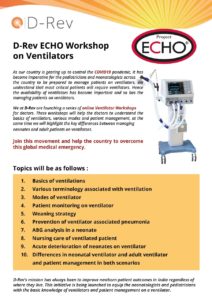 respiratory support tele-clinic in partnership with the Indian Academy of Pediatrics Gujarat 20 April with nearly 300 physicians participating! (An almost 10x increase in participation from our previous Newborn Health ECHO Teleclinics.)
respiratory support tele-clinic in partnership with the Indian Academy of Pediatrics Gujarat 20 April with nearly 300 physicians participating! (An almost 10x increase in participation from our previous Newborn Health ECHO Teleclinics.)
D-Rev’s Expiratory Safety for Non-Invasive Respiratory Support: There is growing awareness that ventilators are not having the hoped-for outcomes with COVID patients. CPAP and other non-invasive treatments offer the most promising treatments – if they can be safely managed.
We ask that you consider partnering with D-Rev in our urgent response to COVID-19. If not by financial support, then by helping us get the word out about our efforts. We have three concrete ways you can help us now:
- Share D-Rev’s COVID-19 response on social media: Our COVID-19 Response webpage is up with more information about our two projects.
Share the one-pagers for our two projects within your philanthropic networks (linked above). These one-pagers are more detailed than our website and include our funding needs.
Learn about and donate to D-Rev
OTHER COVID-19 UPDATES
One Acre Fund
In this uncertain time, food security is more essential than ever. We’re rapidly reinventing our services to keep farmers safe and well-supported in the era of social distancing. When movement was restricted, our field team in Rwanda continued working from home and serving farmers by phone.
As the virus spreads beyond Africa’s urban centers, it threatens to infect a large share of rural populations. Conditions in these communities are uniquely high-risk: Water and sanitation infrastructure is low, the prevalence of malnutrition and diseases like malaria and HIV create increased vulnerability for individuals, and under-developed health systems stand to be quickly overwhelmed.
Looking further ahead, the ripple effects of COVID are laying the groundwork for a regional food crisis. Restricted movement will decrease marketing and selling of farm produce, market closures will substantially lower opportunities for smallholders to generate non-farm income, and increased health costs will deplete household dollars. Smallholder families already experience high levels of food insecurity; these compounding factors will make it increasingly difficult for farmers to invest in farm production or purchase food for their families and children.
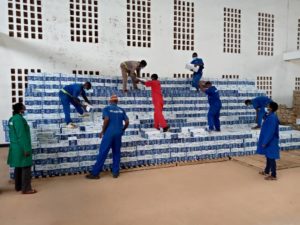
Every aspect of One Acre Fund operations is changing to address this dual threat head-on. We believe that early and strong intervention could make a significant difference for vulnerable farm families.
- Health response: To slow the spread of the virus, we have rolled out mass soap distribution and hand-washing guides to our 1.1M client families, video trainings on building community hand-washing stations with local materials, and safe in-person trainings to clients and frontline staff on social distancing.
- Food security response: After accelerating input deliveries at the initial signs of COVID spread, we are now shifting to proven methods for providing remote farm production services to our clients. We are replacing group farm trainings with video trainings, reference cards, and 1:1 field officer visits at safe distance, and we are accelerating the digitization of our core model — leveraging heavy use of SMS and USSD messaging, remote training, and significant scale-up of phone communication.
You can read more about One Acre Fund’s COVID-19 response work here.
Possible 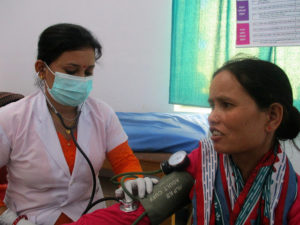
Here is an update from Possible’s CEO, Gita Pillai
Together, we have the opportunity to reduce the suffering and deaths, especially in locations where the outbreak is just beginning. In countries like Nepal, where Possible has supported universal health access to especially vulnerable communities, the call to action is urgent and the moment to respond is now.
Possible is collaborating with others to prepare a timely response. We are working with urgency to secure requisite supplies and equipment to sustain quality patient care, protect providers from infection, and to test and identify cases. We are sharing resources, information on clinical best practices, and communication to control spread.
Possible is working with Nyaya Health Nepal to support a dedicated team of Nepali doctors, nurses, and health workers to respond to the outbreak in line with the Government of Nepal and World Health Organization guidance. They have planned clinical work flows to maintain quality services and timely referral for all patients, established isolation rooms, reinforced infection control protocols, and updated electronic systems to capture COVID-19 surveillance data.
Your contribution will be a valued part of our global response.”
You can read Gita’s full blog here.
Innovations for Poverty Action 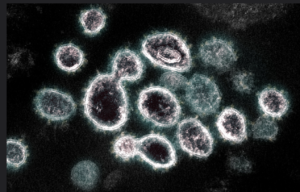
In response to the COVID-19 pandemic, Innovations for Poverty Action (IPA) has launched a major new effort––Research for Effective COVID-19 Responses, or RECOVR. Through this effort, IPA is generating rigorous evidence, advising governments, and bringing together partners across the research-to-policy sector to rapidly provide decision-makers with rigorous data and evidence to mitigate the impacts of the crisis.
IPA’s RECOVR Impact Goals
To equip decision-makers in vulnerable contexts with timely data, evidence, and analysis to:
-
Reduce COVID-19 transmission rates
-
Improve social-safety net responses
-
Build resilient and adaptable businesses and employment opportunities
-
Keep children safe, healthy, and learning
-
Improve women’s health, safety, and economic empowerment
-
Build resilience and protect the financial health of families and individuals
-
Promote peace and safety, and improve humanitarian response
How we are achieving our RECOVR impact goals
Rapid Response Surveys to Answer Critical Policy Questions (8+ countries)
- The RECOVR survey: IPA has built a rapid response panel survey to directly inform key government partners on the health, economic, and social ramifications of the pandemic, and will be running it in eight countries to start. The survey is meant to document real-time trends of policy concern and inform decision-makers about the communities that are hardest-hit by the pandemic. Learn more here.
- The COVID-19 Economic Impact Surveys, a joint effort with the International Growth Centre, is measuring the economic impact of the crisis on a variety of agents, such as large companies, SMEs, informal and micro businesses, self-employed people, workers, and farmers in low- and middle-income countries. Learn more here.
A Portfolio of IPA Studies to Generate Rigorous Evidence on COVID-19 (80+ studies)
- We are rapidly developing more than 80 new individual evaluations related to the COVID-19 response. Some build on existing studies to answer how existing programs under evaluation are impacting people’s ability to cope with the pandemic.
- Others are new studies that have been quickly developed to inform the design of new programs aimed at mitigating the impacts of the crisis on health, livelihoods, learning, and other outcomes.
A Global Hub that Centralizes Research and Policy Lessons (100+ projects)
- We are collaborating with peer organizations to centralize and share research, resources, and funding opportunities to inform global stakeholders and advocate for more funding to be allocated to economic responses, especially in the global south.
Advising Governments on Evidence-Based Approaches
- Over the last five years, we have partnered with dozens of ministries in over 15 countries. Almost every partner we have (and new partnerships we have just formed) has urgent requests for data needs and evidence-informed advice.
- For example, with Y-RISE, CEGA, and researchers, we are advising the government’s social protection responses in Bangladesh, Ghana, Nigeria, and Togo. And we are supporting education system distance learning responses in Ghana, Peru, Rwanda, and Zambia.
Research-on-Research to Strengthen the Quality of Remote Data Collection
- Evaluating different methods and ways of conducting phone surveys
- Hub for data-gathering world: lessons for phone banking in low-income countries
- Evidence synthesis and ‘how-to’ information on phone survey methods (Coming soon!)
Helen Keller International’s Vitamin A Supplementation Program
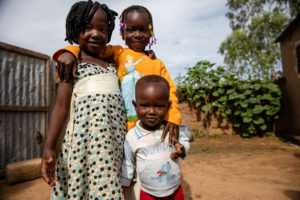
An update from Helen Keller International:
“Helen Keller International has been working for decades to reduce the impact of disease on children and vulnerable communities. This work continues, adapted to the specific challenges posed by the COVID-19 pandemic. Our programs, from vitamin A supplementation to preventing malnutrition to fighting avoidable blindness and vision loss among vulnerable communities, can be life-saving in the context of a viral epidemic.
Helen Keller has supported governments and communities to treat tens of millions of children with vitamin A, following the discovery that supplementation with vitamin A reduced all-cause mortality by over 20%. This is particularly relevant in the current epidemic, because vitamin A deficiency has been extensively shown to impair immunity against viral infection, including viral pneumonia. Vitamin A specifically improves a child’s ability to neutralize viruses in membranes in the gut and lungs. In the COVID-19 pandemic, we have seen enormous differences in the clinical course, from little or no symptoms, to severe illness and death, based in large part of pre-existing immunity. In the increasingly likely scenario of large-scale infection in areas of Africa and Asia with poor nutrition, vitamin A capsules provided by Helen Keller in the last few months could be the difference between life and death for thousands, and potentially millions, of young children. This is also why we are working to continue distributing vitamin A in places where large-scale documentation has not yet occurred. (It is important to note that we are doing so while keeping important precautions, including physical distancing, reduced contact with patients, and frequent hand-washing with soap.)
In addition to this long-standing prevention work, which is likely to yield enormous benefits for the present crisis, Helen Keller offices throughout the world have pivoted to providing immediate support to governments and communities facing the COVID-19 pandemic.”
Donate to Helen Keller International’s Vitamin A Supplementation Program
Against Malaria Foundation (AMF)
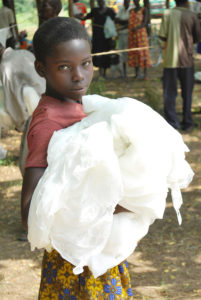
AMF reports that currently the effect of coronavirus on their work is minimal, but they are keeping this constantly under review and are expecting the situation to change as matters develop in Africa. Net distributions are likely to be an important part of minimizing the coronavirus impact as increased malaria rates are likely to increase the mortality rate from coronavirus. AMF remains focused on fundraising to fill significant funding gaps.
Village Enterprise
An update from Village Enterprise:
This pandemic is affecting activities globally and Village Enterprise is no exception. Given the impact that COVID-19 is having on our daily operations, our planned programs and goals will shift for the time being. Our activities will be more aligned and focused on the goal of ensuring that people remain healthy.
With this in mind, we have put together an overview of our response to date below, with the caveat that we are responding to a quickly-evolving situation and our response may change as different situational needs arise.
- In consideration of the health and safety of our staff and program participants, along with recommendations and restrictions put in place by the governments of both Kenya and Uganda, we have just taken the step of pausing our field operations. This has meant suspending group gatherings and nonessential contact in our program activities to prevent the spread of COVID-19. Our main priority is ensuring that our staff remains both employed and healthy, and we are currently working on team-specific adaptation plans and remote work when possible. We will continue to keep you informed as the situation develops.
- We are working on upgrading technological capabilities that we had already been prioritizing organizationally in order to provide remote support to our business owners and communities during the period of closure, however, this initiative is still in the planning phase.
- We anticipate that the effective closure of the economies in both Uganda and Kenya will be extremely difficult for the communities in which we work. With this in mind, we are working on an adaptive response plan on the longer-term effects of the crisis in our communities.
U.S. Coronavirus Bill Includes a $300 Tax Break for Charitable Giving
The U.S. federal coronavirus relief bill grants taxpayers an above-the-line deduction up to $300 for charitable donations in 2020.
Taxpayers normally have to itemize to write-off charitable deductions. In 2020, if you make charitable donations, your Adjusted Gross Income will be reduced by up to $300 and you can still claim the standard deduction. Taxpayers will claim the $300 deduction when they file their 2020 taxes next spring.
This information from moneycrashers.com may be useful for US residents who are looking for federal government assistance because of COVID-19 economic dislocation.






